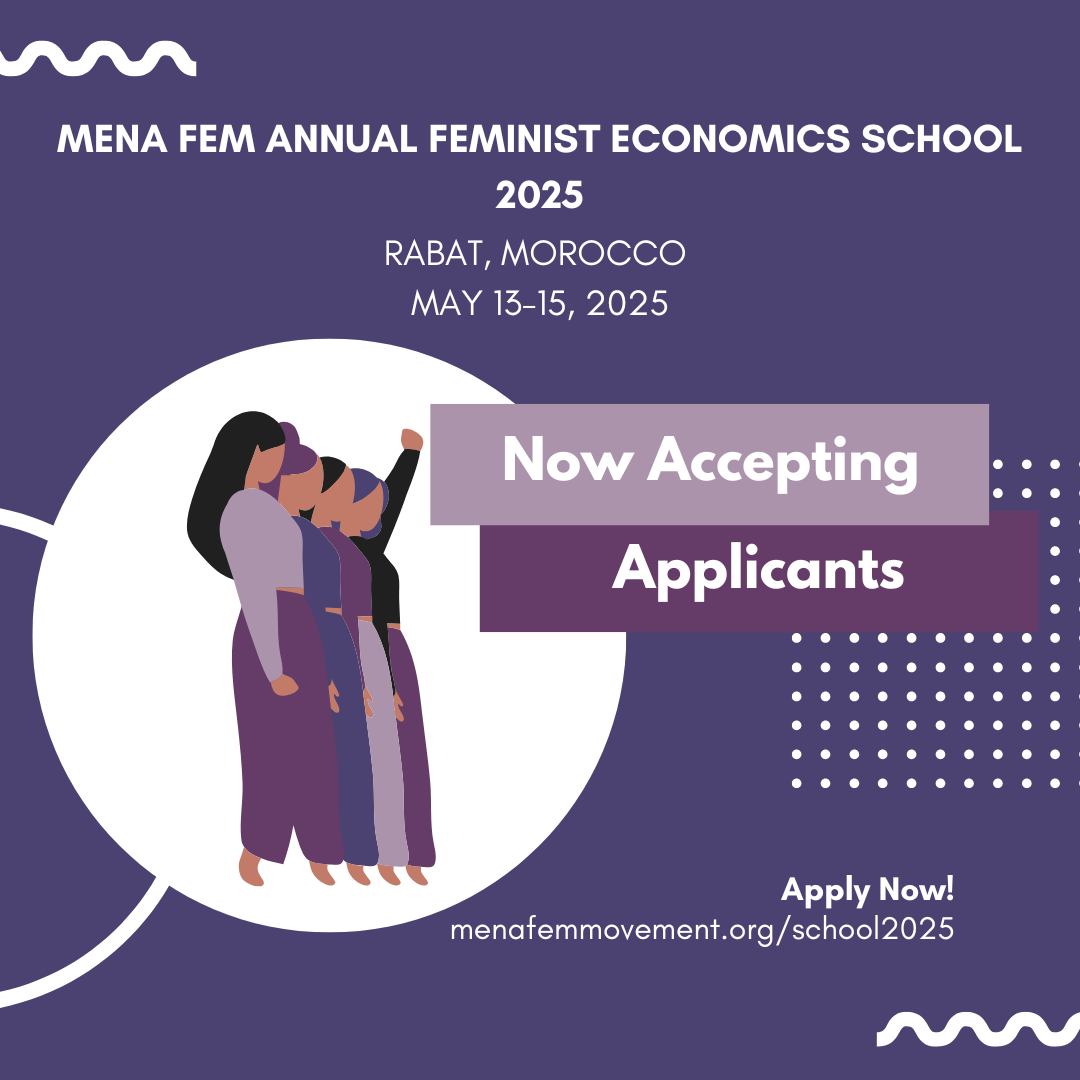MENA Fem Annual Feminist Economics School 2025: Applications Open!
Call for Applications: MENA Fem Annual Feminist Economics School 2025 | Theme in Focus: Economic and Ecological Justice in the MENA Region | Rabat, Morocco | May 13-15, 2025
Call for Applications: MENA Fem Annual Feminist Economics School 2025
Theme in Focus: Economic and Ecological Justice in the MENA Region
Rabat, Morocco | May 13-15, 2025
About the Organizers
MENA Fem Movement for Economic, Development, and Ecological Justice is a nascent and growing loose network concerned with envisioning a new global economic system based on intersectional feminist principles, human rights, and ecological justice driven by the needs of communities and the marginalized, in particular in the Middle East and North Africa (MENA) region and beyond, and working to make it a reality. This school will draw on our expertise in International Financial Institutions (IFIs)/Multilateral Development Banks (MDBs); debt; gender, economic, and climate justice; and their various intersections especially as they manifest in the MENA region, along with our experience in knowledge and movement building, as well as collective advocacy.
About the School
As economic policies continue to prioritize austerity, debt repayment, and neocolonial frameworks, alternative feminist economic models provide a path toward more just and equitable societies. These frameworks emphasize inclusivity, sustainability, and social justice, addressing the specific needs of marginalized communities, particularly women and gender-expansive people in the Global South.
The MENA Fem Annual Feminist Economics School is a unique platform that addresses economic and ecological justice in the MENA region from a feminist perspective. The school aims to create a knowledge-sharing platform for feminist researchers, activists, and CSOs on the themes of the IFA reform, economic justice, and climate finance and justice in the MENA region (and the Global South at large).
Additionally, it seeks to provide opportunities for collaboration and solidarity (especially South-South solidarity) within the feminist movement and to strengthen the capacities of the feminist movement in the region and link them to global advocacy networks and policy dialogues. The school also strives to build and popularize MENA, Pan-African, and Global South feminist perspectives on global economic and climate policy, especially as they intersect with local and regional contexts.
The 2025 edition will focus on the International Financial Architecture (IFA) and its impact on economic and ecological justice in the region, aiming to strengthen feminist engagement in global economic policy discussions and develop concrete advocacy strategies.
The school aims to:
- Provide a space for feminist researchers, activists, and civil society organizations to discuss IFA reform, economic justice, and climate finance in MENA.
- Facilitate South-South solidarity and regional/cross-regional collaboration within the feminist movement.
- Strengthen the feminist movement’s capacity to engage in global advocacy networks and policy dialogues.
- Establish a MENA & Pan-African IFA Working Group to drive ongoing feminist economic advocacy.
The program will include 12 interactive sessions over the course of three days on topics such as:
- Feminist Economics and Political Economy
- International Financial Architecture Reform
- Debt and Austerity
- Social Reproduction Theory
- Gender and Labor Markets
- Land and Agrarian Justice
- Food Security
- Climate Finance and Ecological Justice
- False Solutions
- Global Processes such as the Financing for Development Process
All topics will be covered from a feminist and Global South/MENA region-specific perspective. The school will also involve opportunities for networking and advocacy strategizing.
Expected Outcomes
- Raise awareness among feminist activists and researchers about the impact of the IFA on the MENA region.
- Develop a regional position on IFA reform and initiate advocacy efforts to influence international financial institutions.
- Establish a MENA/Pan-African IFA Group that continues working on the issue beyond the school
Who Should Apply?
We welcome feminist activists, academics, researchers, and civil society actors from the MENA region who are working on or interested in:
- Feminist economics, gender justice, social justice, ecological justice, community organizing, or policy advocacy.
- Region-specific economic and environmental challenges, such as socioeconomic inequality, climate justice, neocolonial practices, and conflict.
- Strengthening feminist economic advocacy and engaging in global economic policy discussions.
Eligibility Criteria
- Must be based in or actively engaged in work within the MENA region.
- Demonstrated alignment with feminist values, including anti-colonialism, inclusivity, intersectionality, care-centered economies, sustainability, and socioeconomic justice.
- Proficiency in Arabic or English to ensure active participation in the school. Most sessions will be delivered in Arabic, but simultaneous interpretation will be provided in English.
- Must commit fully to the school’s duration and engage actively in all sessions.
- We welcome participants of all ages, genders, and experience levels. However, we strongly encourage individuals from underrepresented groups—including women, gender-expansive individuals, people with disabilities, and those from marginalized socioeconomic backgrounds—to apply. We also invite applications from young people who may not yet have extensive experience.
Application Process
Interested applicants must complete the online application form by 24/2/2025.
Only 15 applicants will be selected. Selected participants will be notified by 7/3/2025.
Travel and Logistics
- The school will take place in Rabat, Morocco, from May 13-15, 2025.
- Participants are expected to arrive on May 12 and depart on May 16.
- Participants must commit to attending the entire three days of the school.
- Flights and accommodation will be fully covered for selected participants.
- Participants will be responsible for securing their own visas.
Join us in reimagining economic systems through feminist, anticolonial, and justice-oriented lenses!


